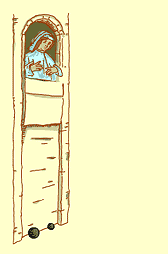
|
 |
That's right. As you predicted, the two objects fell together and hit the ground at the same time.
According to Aristotle, whose writings had remained unquestioned for over a 1,000 years up until Galileo's time, not only did heavier objects fall faster than lighter ones, but an object that weighed twice as much as another would fall twice as fast. By that logic, in this experiment the 10 lb cannonball would have fallen ten times faster than the 1 lb cannonball. Even Galileo's contemporaries could see that this wasn't the case. Still, some held on to their views. One of Galileo's thought experiments, however, clearly revealed a problem with the Aristotelian view of gravity...
|

